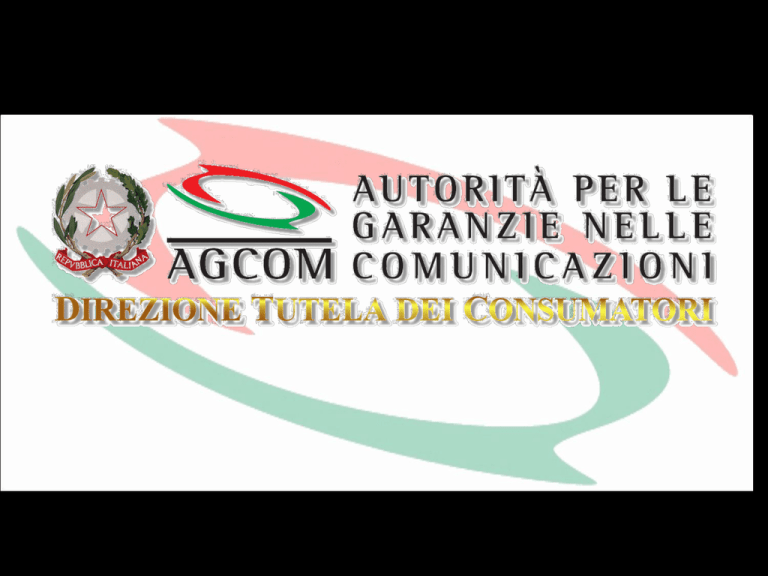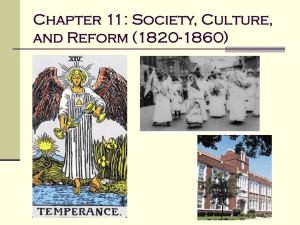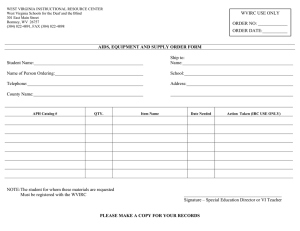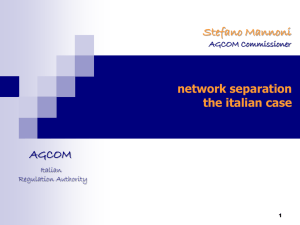Document 12940279
advertisement

DISABLED USERS PROTECTION in the Electronic Communications market by the Italian NRA Agcom Resolution n. 79/09/CSP In 2009 the Italian NRA (AGCOM) approved some rules to assure suitable quality of the customer assistance services made available from the providers of electronic communication services. The targets of the resolution are fixed and mobile telephony operators. The rules are going to be extended to Pay-TV operators, whilst the small ISP are, at moment, not involved. The main objectives of the resolution ➨ To guarantee to the users the right to get a suitable and satisfactory assistance ➨ To get a progressive improvement of the quality of the service To assure the usability of the service to the disabled users (deaf people). Rules foreseen for assistance of deaf customers ➨ Call centers should anyway guarantee the access the inbound service from the deaf users, by use of suitable relay service technologies ➨ Following relay services should be made available: a) Chat and SMS, providing real time answers to the user request; b) Fax and e-mail, providing postponed answers (anyway to be provided within two hours) Fall-back solution for assistance of deaf customers ➨ Whenever either SMS or Fax or e-mail service is not available, the contact with the deaf user should be additionally guaranteed from the operator, by interfacing call center with the so-called “bridge-service” ➨ The deaf user is connected to the brige-service by a special terminal ➨ The bridge-service is provided either from the operator itself or from some specialized association of deaf people. In Italy association providing this service is the most important one: the ENS (Ente Nazionale per la protezione e l’assistenza dei Sordi) Agcom Resolution n. 514/07/Cons In 2007 AGCOM approved some innovative rules for the protection of disabled users, deaf and blind, which marked a breaking point if compared to traditional settings. Why the new rules broke with the past The most important news is that all the operators had to contribute for the provisioning of specific services at better conditions for deaf and blind people, and this, therefore, outside the scope of Universal Service. Disabled users can choose among all the new technologies Agcom believed that only in this way the "right of choice" for disabled users could be effectively protected, to fulfill their equality with other users. The right of choice … Particularly, deaf and blind users must not be obliged to choose among the services falling within the Universal Service to obtain favourable economic conditions. … and the equality with the other users In other words, deaf and blind users have the right – as all the other users – to choose between all market operators and among all the available services (fixed, mobile, Internet), to find those that fit the best their communication needs. The contribute of the Associations The procedure for the approval of the new rules was long and complex and it involved, in addition to the operators, some of the Associations representing disabled categories concerned, who provided valuable information on the practical difficulties that deaf and blind users face in the use of communications services. The new rules for deaf users Deaf users have difficulties using voice services, so AGCOM provided on fixed lines: exemption of payment of the fee of the residential universal service; on mobile lines: all operators must prepare each year a specific offer for providing at least 50 free sms per day, on net and off net, and the best prices for all data services. The new rules for blind users Blind users have difficulties in connecting to the Internet (for which they often use text-to-speech systems, requiring long connection times), so all operators, no matter what type of offer and speed of navigation chosen by the blind users, must recognise 90 free hours of Internet access per month or 50% discount on Internet connection in case of flat or semi-flat offers. How to inform the users about the facilities To make deaf and blind users aware of their rights, AGCOM dediced that operators must cooperate with their representative Associations to create forms of advertising of concessions and general information adapted to the needs of understanding of deaf and blind users. How to get the facilities Moreover, to facilitate the exercise of these rights for deaf and blind users, AGCOM established that to obtain the favorable conditions users only have to send a medical certification with modules made available from the operators. The supervision on the new rules Since the adoption of the new rules Agcom works with the Associations that constantly report application issues or violations of the rules, so giving a valuable contribution to the effectiveness of the protection. *** In 2009, AGCOM obtained a prize by the Ente nazionale sordi for the effective protection that results from these rules.




